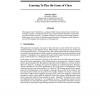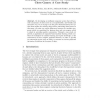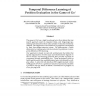288 search results - page 1 / 58 » Learning to Play Chess Using Temporal Differences |
ML
2000
ACM
13 years 4 months ago
2000
ACM
In this paper we present TDLEAF( ), a variation on the TD( ) algorithm that enables it to be used in conjunction with game-tree search. We present some experiments in which our che...
NIPS
1994
13 years 5 months ago
1994
This paper presents NeuroChess, a program which learns to play chess from the final outcome of games. NeuroChess learns chess board evaluation functions, represented by artificial...
CG
2008
Springer
13 years 6 months ago
2008
Springer
Abstract. By developing an intelligent computer system that will provide commentary of chess moves in a comprehensible, user-friendly and instructive way, we are trying to use the ...
NIPS
1993
13 years 5 months ago
1993
The game of Go has a high branching factor that defeats the tree search approach used in computer chess, and long-range spatiotemporal interactions that make position evaluation e...
CG
2000
Springer
13 years 8 months ago
2000
Springer
Abstract. Over the years, various research projects have attempted to develop a chess program that learns to play well given little prior knowledge beyond the rules of the game. Ea...




